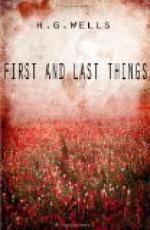In our achievement of understandings in the place of these evasions about fundamental things lies the road, I believe, along which the human mind can escape, if ever it is to escape, from the confusion of purposes that distracts it at the present time.
1.2. The resumption of metaphysical enquiry.
It seems to me that the Greek mind up to the disaster of the Macedonian Conquest was elaborately and discursively discussing these questions of the forms and methods of thought and that the discussion was abruptly closed and not naturally concluded, summed up hastily as it were, in the career and lecturings of Aristotle.
Since then the world never effectually reopened these questions until the modern period. It went on from Plato and Aristotle just as the art of the seventeenth and eighteenth century went on from Raphael and Michael Angelo. Effectual criticism was absolutely silent until the Renaissance, and then for a time was but a matter of scattered utterances having only the slightest collective effect. In the past half century there has begun a more systematic critical movement in the general mind, a movement analogous to the Pre-Raphaelite movement in art—a Pre-Aristotelian movement, a scepticism about things supposed to be settled for all time, a resumed inquiry into the fundamental laws of thought, a harking back to positions of the older philosophers and particularly to Heraclitus, so far as the surviving fragments of his teaching enable one to understand him, and a new forward movement from that recovered ground.
1.3. The world of fact.
Necessarily when one begins an inquiry into the fundamental nature of oneself and one’s mind and its processes, one is forced into autobiography. I begin by asking how the conscious mind with which I am prone to identify myself, began.
It presents itself to me as a history of a perception of the world of facts opening out from an accidental centre at which I happened to begin.
I do not attempt to define this word fact. Fact expresses for me something in its nature primary and unanalyzable. I start from that. I take as a typical statement of fact that I sit here at my desk writing with a fountain pen on a pad of ruled scribbling paper, that the sunlight falls upon me and throws the shadow of my window mullion across the page, that Peter, my cat, sleeps on the window-seat close at hand and that this agate paper-weight with the silver top that once was Henley’s holds my loose memoranda together. Outside is a patch of lawn and then a fringe of winter-bitten iris leaves and then the sea, greatly wrinkled and astir under the south-west wind. There is a boat going out which I think may be Jim Pain’s, but of that I cannot be sure...
These are statements of a certain quality, a quality that extends through a huge universe in which I find myself placed.




